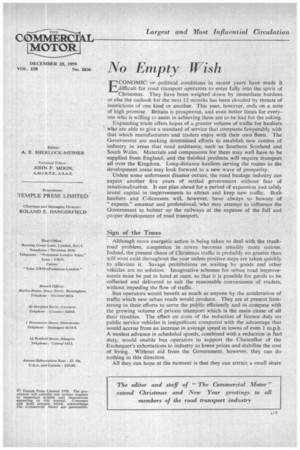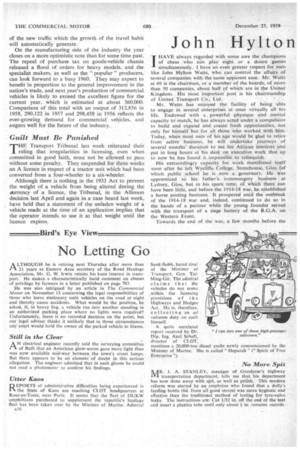No Empty Wish
Page 17

Page 18

If you've noticed an error in this article please click here to report it so we can fix it.
ECONOMIC or political conditions in recent years have made it difficult for road transport operators to enter fully into the spirit of Christmas. They have been weighed down by immediate burdens or else the outlook for the next 12 months has been clouded by threats of restrictions of one kind or another. This Year, however, ends on a note of high promise. Britain is prosperous, and even better times for everyone who is willing to assist in achieving them are to be had for the asking.
Expanding trade offers hopes of a greater volume of traffic for hauliers who are able to give a standard of service that compares favourably with that which manufacturers-and traders enjoy with their own fleets, The Government are making determined efforts to establish new centres of industry in areas that need assistance, such as Southern Scotland and South Wales. Materials and components for them may well have to be supplied from England, and the finished products will require transport all over the Kingdom. Long-distance hauliers serving the routes to the development areas may look forward to a new wave of prosperity.
Unless some unforeseen disaster occurs, the road haulage industry can expect• another• five years of settled government without fear of renationalization. It can plan ahead for a period of expansion and safely invest capital in improvements to attract and keep new traffic. Both hauliers and C-licensees will, however, have always to beware of "experts," amateur and professional, who may attempt to influence the Government to bolster up the railways at the expense of the full and proper development of road transport.
Sign of the Times
Although more energetic action is being taken to deal with the trunkroad problem, congestion in towns becomes steadily more serious. Indeed, the present chaos of Christmas traffic is probably no greater than will soon exist throughout the year unless positive steps are taken quickly to alleviate it. Savage prohibitions on waiting by goods and other vehicles are no solution. Imaginative schemes for urban road improvements must be put in hand at once, so that it is possible for goods to be collected and delivered to suit the reasonable convenience of traders, without impeding the flow of traffic.
Bus operators would benefit as much as anyone by the acceleration of traffic which new urban roads would produce. They are at present hamstrung in their efforts to serve the public efficiently and to compete with the growing volume of private transport which is the main cause of all their troubles. The effect on costs of the reduction of licence duty on public service vehicles is insignificant compared with the advantage that would accrue from an increase in average speed in towns of even 1 m.p.h. A modest advance in scheduled speeds, combined with a reduction in fuel duty, would enable bus operators to support the Chancellor of the Exchequer's exhortations to industry to lower prices and stabilize the cost of living. Without aid from the Government. however, they can do nothing in this direction. All they can hope at the moment is that they can attract a small share of the new traffic which the growth of the travel habit will automatically generate.
On the manufacturing side of the industry the year closes on a more optimistic note than for some time past. The repeal of purchase tax on goods-vehicle chassis released a flood of orders for heavy models, and the specialist makers, as well as the "popular" producers, can look forward to a busy 1960. They may expect to benefit in proportion to the general improvement in the nation's trade, and next year's production of commercial vehicles is likely to exceed the excellent figure for the current year, which is estimated at about 360,000. Comparison of this total with an output of 312,856 in 1958, 290,122 in 1957 and 298,458 in 1956 reflects the ever-growing demand for commercial vehicles, and augurs well for the future of the industry.
Guilt Must Be Punished
THE Transport Tribunal last week reiterated their ruling that irregularities in licensing, even when committed in good faith, must not be allowed to pass without some penalty. They suspended for three weeks an A licence in respect of a tractor unit which had been converted from a four-wheeler to a six-wheeler.
Although there is nothing in the 1933 Act to prevent the weight of a vehicle from being altered during the Ottrrency of a licence, the Tribunal, in the Allinson decision last April and again in a case heard last week, have held that a statement of the unladen weight of a vehicle made at the time of an application implies that the operator intends to use it at that weight until the licence expires.
















































































